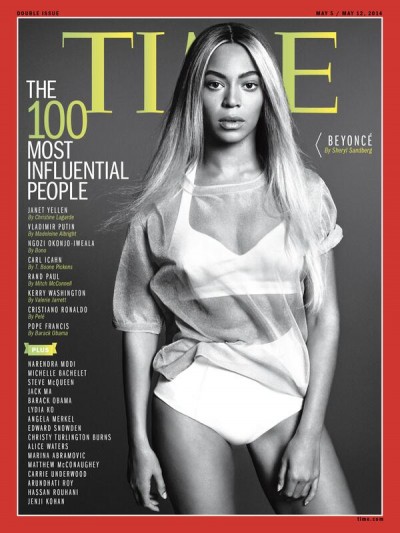by Ashley Canino
Here are some of the past week’s top pop culture stories as covered by women journalists.
1. Beyoncé covers the Time 100 Most Influential People Issue
by Sheryl Sandberg
Queen Bey continues to reign supreme, landing the coveted cover of Time and their designation as one of the most influential people of the year. The pop empress has been lauded and scrutinized over the past year, but Lean In/ Facebook’s Sheryl Sandberg continued to show her support by profiling Bey for the issue. She describes Beyoncé as a celebrity hero for women, who insists that girls do indeed, “run the world.”
2. Bustle Interviewed Alena Graedon, Author of “The Word Exchange”
by Claire Luchette
Heroines and dystopian worlds go hand in hand in contemporary entertainment, like The Hunger Games‘ Katniss and Divergent‘s Tris. Alena Graedon’s The Word Exchange also features a female protagonist, Anana Johnson, tasked with rescuing the English language from the all-consuming technology of a post-print world. This interview with the author focuses on her choices in addressing language and the contemporary fragility of language.
3. Aaron Sorkin Addressed Why There Are So Few Female Protagonists in Film
by Molly Mulshine
On Monday, Academy and Emmy Award-winning writer Aaron Sorkin attempted to address the disparity between strong male and female characters on screen, and perhaps suffered from a poor choice of words. His answer, which places much of the burden for the lack of dynamic female leads on both female movie-goers and women in the industry, has unsurprisingly drawn media backlash. This piece, from The Observer, brings to light institutionalized sexism in the film industry and how no industry heavyweight–regardless of their critical acclaim–is exempt from responsibility.
4. NPR Examined Transgender Roles in Film and Television
by Neda Ulaby
Transgender people are another underrepresented group in mainstream entertainment. Recently, scripted television has made some progress in featuring these parts, and not just in sideshow roles like serial killer or sex worker. Portrayal of transgender characters is evolving, but there is still a ways to go, notably in the lack of female-to-male transgender roles. This survey piece by NPR examines, compares and contextualizes the more nuanced, dynamic transgender figures we see on screen today in an entertainment landscape that has all but normalized gay and lesbian personas.




